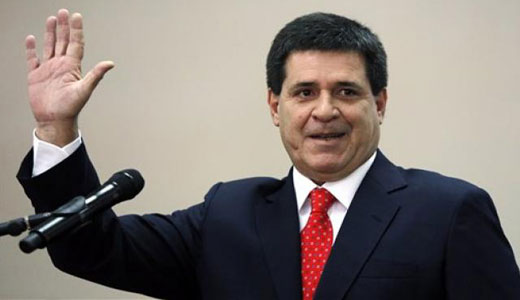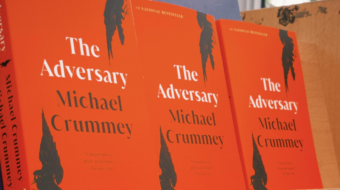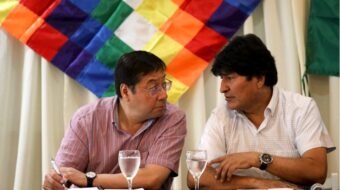
The so-called “legal” coup that removed progressive Paraguayan President Fernando Lugo from power on June 25, 2012 set the stage for large agricultural corporations, particularly soybean producers, to establish control over Paraguay’s government. The wealthy Horacio Cartes’ election to the presidency in April, 2013 restored dictator Alfredo Stroessner’s Colorado party to power. Yet opposition forces remain active.
In a radio address on Dec 30 labor leader Bernardo Rojas declared that 2013 was a “hard, difficult” year because of persecution and austerity policies. He condemned “criminalization of social struggle” and announced a general strike set for March 26, 2014. Hundreds had rallied in front of the National Congress in Asuncion to mark four months of the Cartes presidency which began on Aug 1. The demonstration’s theme was “100 days that shouldn’t have been, of militarization and surrender, militarization and accusations.” In November, street demonstrations continued in San Pedro department a day after the police shot and wounded two of some 200 activists protesting displacement of small farmers from land lost to private interests.
The crisis in Paraguay began on June 15, 2012 when 300 police forcibly removed 50 would-be occupiers from land without clear title in Curuguaty district. President Lugo’s political opponents exploited the violent fallout – 17 were killed and 20 wounded including police – to accuse the Lugo government of incompetence and engineer Lugo’s removal through parliamentary action. Plotters raised the specter of terrorism by identifying the Paraguayan People’s Army, leftist insurgents, as backing small farmer agitation. The Lugo government may have forced the hand of coup perpetrators by seeking to block agribusiness plans to import genetically modified seed corn.
Pos – coup governments first headed by former Vice President Frederico Franco and Cartes later on went to work. The executive branch gained new powers under a modified Law 1337/99 to deploy the military and police for internal security purposes. Expanded police and military capabilities are being “financed by the landholding class and foreign capitalists,” one observer claimed. Agrarian rights activists confront security forces equipped with high- technology weapons and tools and advised by Israeli and US operatives.
Commentator Jose Carlos Lezcano points also to new “fiscal responsibility” legislation; Law 5.098/13 prescribes budgetary cuts and structural adjustment policies. A novel “law of public-private alliance” authorizes privatization of “strategic resources,” including state owned enterprises.
The police assassinated eight agrarian rights leaders, supposedly for the purpose of “decapitating” opposition leadership. The fear-laden atmosphere and Colorado Party control of electoral processes resulted in the victorious Cartes gaining 45 percent of the presidential votes cast in April. The candidate of the left-leaning Guasú Front coalition took a mere 3.5 percent of the votes. Now, says Lezcano, power brokers have “surrendered the country to transnational gangsters.”
That would be Monsanto, Dow, Agrotec, and Syngent corporations. Within months of the coup, the Agricultural Ministry approved their use of transgenic corn blocked under the Lugo government. Lezcano claims Paraguay has suffered a “major loss of sovereignty and effective loss of civil rights,” along with diminishing state-sponsored social services.
The stage is thus set for Paraguay, the world’s sixth largest soybean producer, to maintain its role, along with Brazil, Argentina, and Uruguay, as a soy juggernaut providing industrialized societies with the prime raw material for bio-diesel fuel and animal feeds. Current political arrangements, a legacy of the 35- year long Stroessner dictatorship, favor skewed land-owning patterns. Currently two percent of owners control 85 percent of Paraguayan farmland there; four percent of soybean growers control 60 percent of soy growing land. Foreigners, often Brazilians, own almost 20 percent of such land. .
Foreign sales of soybeans and beef yield sales worth $10 billion, yet producers and processors pay only two percent of the government’s revenue requirements.
Excluded from regular participation in governmental processes, agrarian rights activists point to harm done to natural and human environments. Accounts surface, for example, of poisoned rivers, soil and human beings through the extravagant use of pesticides and herbicides. Conversion of land for large scale agricultural use has led to tens of thousands of small-farmer families being displaced. They often end up living precariously on the edges of cities.
Deforestation in Paraguay is extreme. During the last half of the 20th century, 75 percent of the original forest cover disappeared. The trend has accentuated: In 2010 in western Paraguay forests of 580,000 acres were cut down. During the following year, the total mounted to 618,000 acres.
And irony of all ironies: despite annual soy exports amounting to 300,000 tons, and of meat products to 200,000 tons, one fourth of Paraguayans are hungry, according to the United Nations Food Program. Some 20 percent of rural inhabitants live in extreme poverty.
Photo: Horacio Cartes. Jorge Saenz/AP










